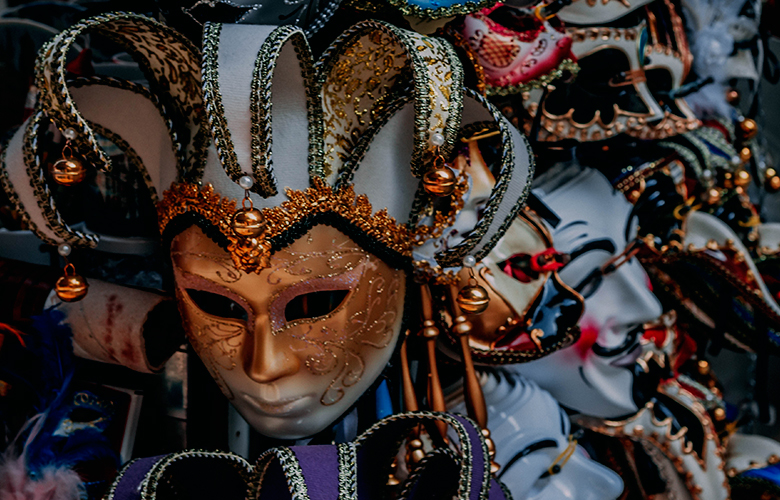
I remember the first time I spent any length of time backstage in my home country, Germany. Some years earlier, I had worked for the creation of a play in Zurich, Switzerland. All had gone well. For the creation of this second play in Northern Germany, I came in about a week before the premiere and I had no idea about theatre superstitions.
I stepped into it from day one…
Brimming with enthusiasm, I walked backstage with my hat on. It was winter, and almost as freezing cold backstage as it was outside, so it hadn’t even occurred to me to take the hat off. Angry looks from a couple carpentry guys confused me for a moment. Then, one of the actors ran towards me, “Oh my god, you can’t wear a hat backstage. Take it off immediately and knock on wood somewhere.” I chuckled a bit, then stopped when I noticed he wasn’t joking. “Sorry. Sure.” I said, quickly stuffing my hat into a coat pocket and touching the next best wooden props piece for a couple seconds. He looked relieved and walked off, shaking his head and mumbling to himself all the way.
The next day, I arrived with a dark green t-shirt on and was grabbed a minute later by another aggravated actor, who gave me one of his shirts for the day. Something about the color green which also seemed to cause disaster.
The third day, in a particularly good mood, I came in whistling loudly. No one even needed to say anything. Looks did kill. My whistling at least. I shut up, wondering if I would ever be able to get anything right. That day, I talked to one of the actors and asked her what on Earth was going on. “We are a superstitious bunch,” she said, “There are lots of things you can’t do backstage. It’s really bad luck. Whatever you do, Liam, for God’s sake, on the day of our premiere, only wish people ‘toi toi toi’ or ‘break a leg’. Don’t say the other words. You know which ones, right? I can’t really say them. But don’t say them! It’ll be really bad luck for our premiere and the entire run of the show.”
“Oh, ok, I know what you mean,” I said. Frankly, not having a clue what she was on about. This was the beginning of my interest in theater superstition. I began researching online that day to hopefully find out what it was I wasn’t supposed to say. As it turned out, Armageddon may have ensued, had I uttered the words ‘good luck’ before the premiere.
To save you from being the person responsible for your show turning into a disaster, here is a little collection of common theatre superstitions:
There are lots of possible origins of this phrase. One possibility goes back to ancient Greece. Greek citizens would stomp their feet every time they loved a play. Sometimes they stomped hard enough, so people became worried someone might break a leg. So, when you say “break a leg” to someone from the cast or crew before a performance, you are conjuring overwhelming appreciation from the audience.
“Good luck” on the other hand jinxes the performance. Because many theatre folks believe that there are mischief-making spirits backstage who will use their magic powers to force the opposite of what you wish to happen.
This superstition is based on real dangers of the past. In the good old days of theater, scenery was manually lifted into the air by stage crew hoisting it with ropes (there were no hydraulics or advanced rigging systems to make it more controlled, safer, and easier). Back then, the stage crew cued each other with whistling. Anyone else whistling backstage might have cued someone to accidentally drop a piece of scenery onto someone and could have caused them serious injury. The strict rule of never whistling backstage has been kept ever since.
Clapping onstage falls into the same category. It is bad luck because it was also used by the stage crew sailors overhead (the first riggers) to communicate their cues.
This superstition isn’t widely known anymore. Like most of these ingrained beliefs it has its origins in the old days of theater. Back then, blue dye was the most expensive of all fabric colorings. In an effort to discourage costume designers from straining the budget, producers started a rumor that blue costumes were unlucky.
Green, on the other hand, dates back to the times when most plays were performed outdoors. Wearing green would make it hard to distinguish the actor from grass, trees, or bushes, which would lead to accidents or affect the quality of the performance.
This curious practice goes way back to ancient Greece again. It is connected to all the spirits which are believed to be haunting the backstage world. Thespis was the first well-known actor in ancient Greece. He is one of the spirits said to cause accidents in theatrical productions, especially when the lights are out and everything is shrouded in pitch-black. This is why, to this day, many theaters still leave a single light burning brightly on center stage, even when they are closed.
Ok, I’ll risk spelling it out here, but don’t under any circumstances say it out loud, ok? Don’t even read it out loud. Since ‘Macbeth’ was first performed in 1606, it’s been said that this play has been stricken by more accidents, illness, and general misfortune than any other play in history. The play includes a lot of sword fighting, so it is possible that especially in its early days it caused a huge number of gory injuries.
In traditional theater you absolutely cannot mention this title anywhere near a stage. Instead, even if you are actually performing exactly this piece, call it “The Scottish Play” instead, or you’ll unleash super destructive forces upon the entire cast and crew.
No one is quite sure how this particular superstition started. But many theater folks get nervous if the dress rehearsal goes too well. They firmly believe that a bad dress is a good omen for the success of opening night. This does prove true sometimes and most likely has its roots in simple psychology: a horrible dress rehearsal scares cast and crew and focuses their attention. Plus, all mistakes made during the dress, highlight problems which can then be fixed before opening night.
These are just a few key superstitions in detail.
There are countless more:
Yes, you might have guessed, the list goes on indefinitely…
Theater has existed far longer than most of us realize. The first plays were performed in the ‘Theatre of Dionysus’, built in the shadow of the Acropolis in Athens in the early days of the 5th Century. Theater is a magical world. A world of artistic expression, social critique, and storytelling. A world of emotion, offering our audiences relief from their daily sorrows. It is not surprising that during the creation of such works of wonder, ghosts and superstitions need to have their place, too.
A Brief History of Cirque du Soleil
The Importance of Kindness in Entertainment


Liam Klenk was born in Central Europe and has since lived on four continents. Liam has always been engaged in creative pursuits, ranging from photography and graphic design, to writing short stories and poetry, to working in theatre and shows. In 2016, Liam published his first book and memoir, 'Paralian'.
Read Full Profile© 2021 TheatreArtLife. All rights reserved.

Thank you so much for reading, but you have now reached your free article limit for this month.
Our contributors are currently writing more articles for you to enjoy.
To keep reading, all you have to do is become a subscriber and then you can read unlimited articles anytime.
Your investment will help us continue to ignite connections across the globe in live entertainment and build this community for industry professionals.